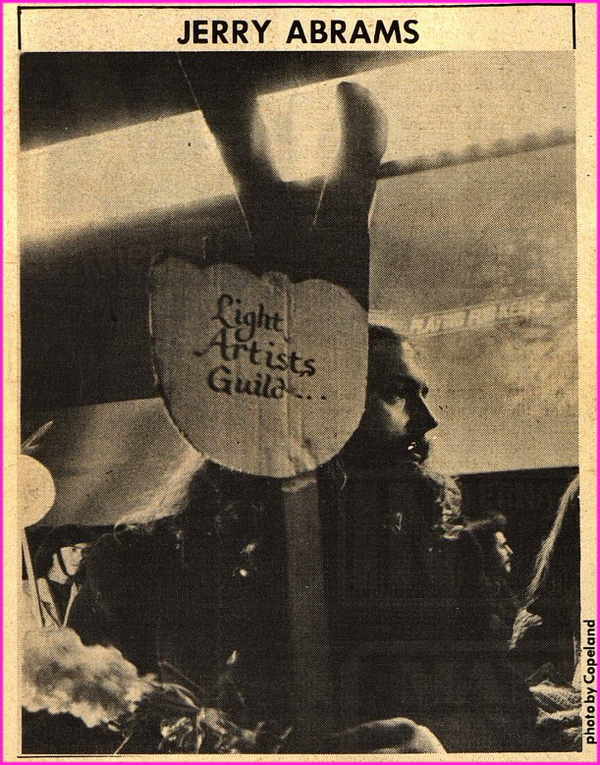Rabbit Hole - The Light Artists Guild &The Great 1969 Light Show Strike |
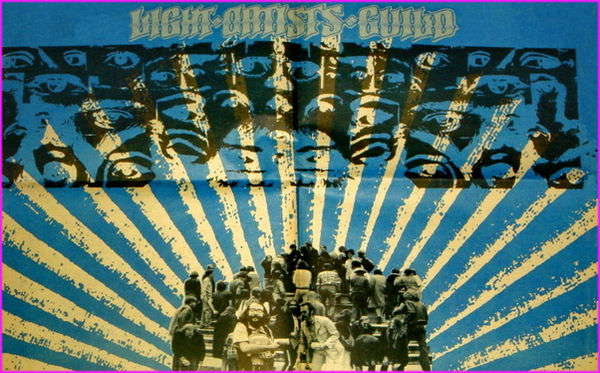 |
The Light Artists Guild was setup in the San Francsico Bay Area in an attempt for Light Show Operators to have improved (fair) pay and recognition for their craft on Rock Posters. Eventually their membership grew to around 500 members with over 60 Light Show's joining the cause from other US States such as Salt Lake City, Washington D.C and other areas of California. Ray Anderson (Holy See), Jerry Abrams and Glenn McKay of Headlights were the key members and there was a Negotiation Team containing members from various Light Shows:
Rows soon broke out between The Guild and local promotors Chet Helms and Bill Graham resulting in a series of 'Industrial Action' strikes/protests taking place in the Bay area resulting in Bill Graham quitting San Francisco and shutting down the Fillmore West. |
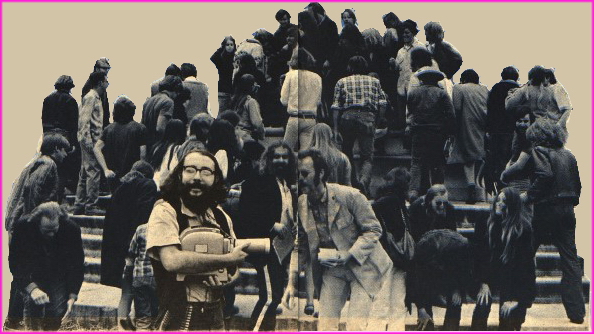 |
Light Artists Guild MembersVince Casalina with Leitz Prado (Dr. Zarkov)Jerry Abrams (striped pants) (Headlights) Glenn McKay (White Suit) (Headlights) |
From Berkeley Tribe, Volume 1, issue 4, August 1-7, 1969:Lights out at S.F. Ballrooms by Tari It will be lights out tonight for the Family Dog Ballroom on the Great Highway. The Light Artists Guild, representing more than 60 bay area light shows, will strike the Family Dog on Friday with picket lines around the ballroom. What the sounds will be like (if any) is at this moment anybody’s guess. Gerry Garcia, lead guitarist for the Grateful Dead which is scheduled to play the Dog this weekend has stated that he will not cross the Guild picket line. If other rock groups follow Gerry’s lead, both the Dog and Fillmore West will be shutdown by next weekend. The Guild will strike the Fillmore West next Tuesday, after a Guild member finishes this weekend’s previously-contracted performance. Reaction to the strike from Fillmore proprietor Bill Graham was quick and caustic. “These scumbags have the audacity to threaten me with a picketline,” he said. Graham told the Tribe that the light show was not a draw factor and that he would fill up his ballroom just as easily without the light artists “We are not here to put them in business,” Graham said, “but to support their craft. And we will determine on what level we support their endeavor.” The Guild states that both Graham and Dog head Chet Helms have refused to talk to the Guild as an organization — that they will only talk to the individual light shows. The Light Artists Guild began to get themselves together about two months ago in an attempt to “further the light show as an art form,” as one member put it. While the members emphasize that they are not strictly a union, they can function in traditional union ways. They will announce the strike at a press conference Friday morning and ask rock groups and ballroom patrons to respect their picket line. “Like rock groups, we want our. art to be self-supporting,” one Guild member said. “The light show is an integral part of the- rock environment; we are writing art history, but we want to expand and embellish the art.” With each group averaging; about five members, the present rate of $100 per night barely covers the cost of projectors, film, oils, cameras, and bulbs. The Guild is seeking $600 for 3 nights work at the Family Dog and $650 for the same time at the Fillmore. (The difference is based on the difference in the two ballrooms’ capacities.) The Guild’s third demand is that light artists be given at least 35% of the billing in all advertisements for a concert. So far, the Guild' is only beginning to receive response from local rock groups. Both Countiy Joe and the Fish and Gerry Garcia of the Grateful Dead have promised to honor the picket line. the Tribe asked Garcia if he could be in trouble for violating his contract at the Dog this weekend by, refusing to cross the picket line. “It doesn’t have anything to do with unions or picket lines,” he said. “I know where the Guild is at and I know how much they need to do their thing. I would prefer to play, but I won’t cross their picket line. Those who are of the subculture and who are fed up with the Establishment’s exploitation of its arts, feel the same as Gerry. As one Guild member stated, “For the first time artists have sat together in the same room and have forgotten their petty competition.” The Berkeley Tribe is one example of people getting together and refusing to let the Man make them competitors. The Light Guild is another example of the same thing. The rock groups are next. As one Guild spokesman stated, “Man, this is going to spread.” |
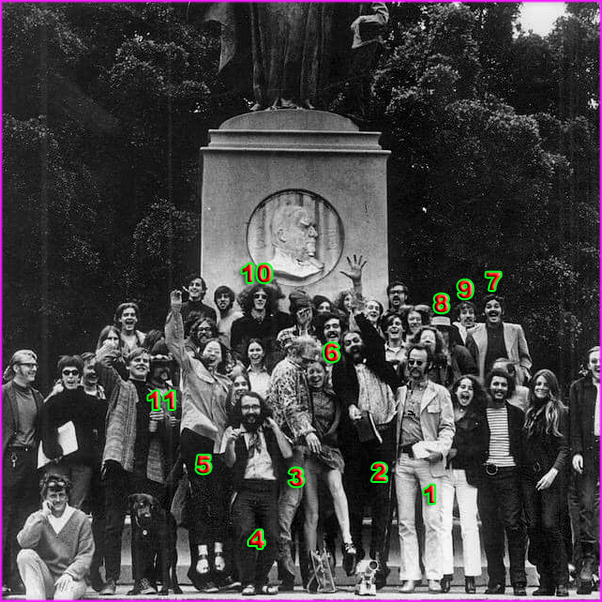 |
Light Artists Guild members |
1- Glenn McKay (Headlights) |
Can you ID anyone else in this pic? (Email Me!) |
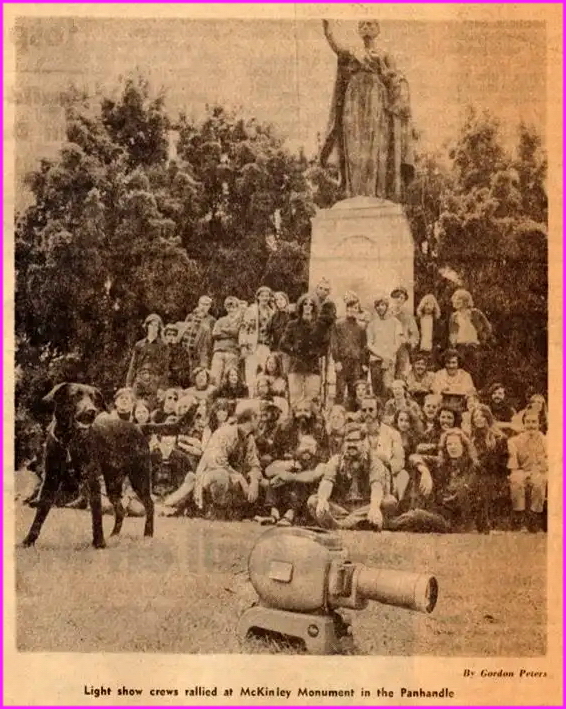 |
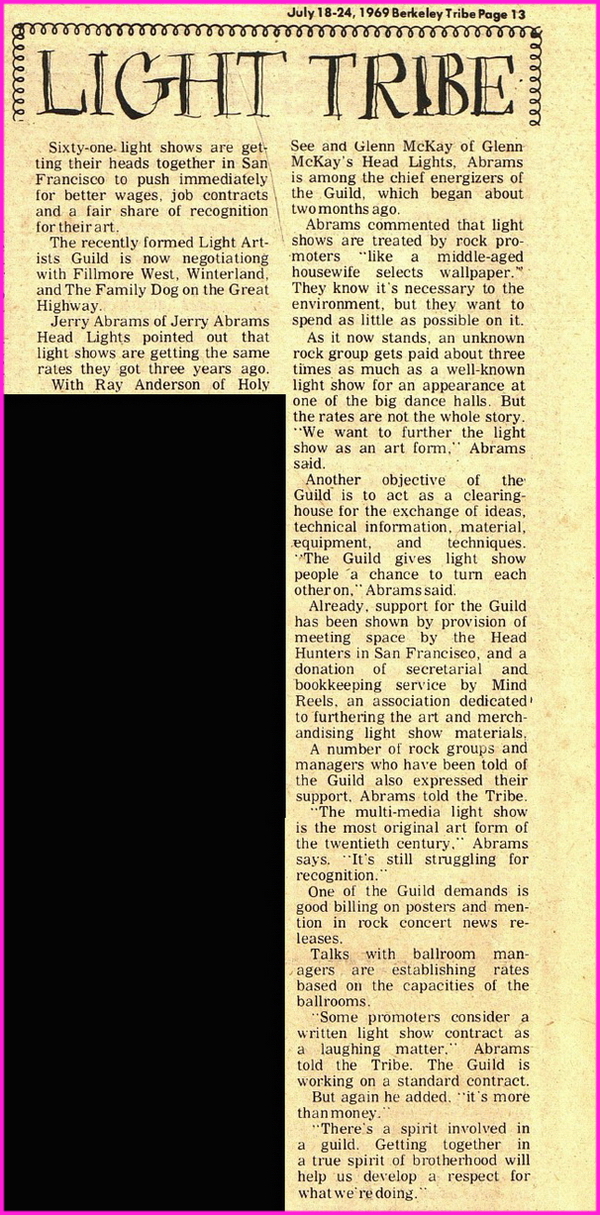 |
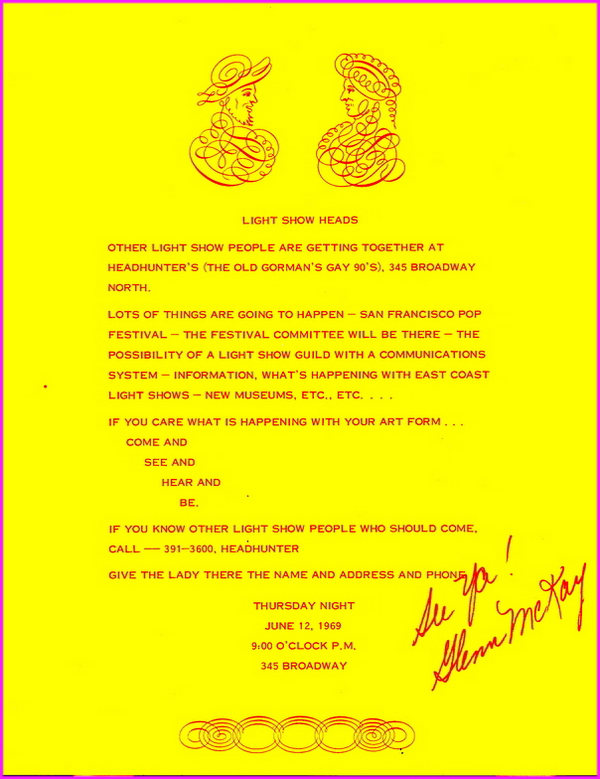 |
Courtesy of Rick Herbert, Optic Illusion |
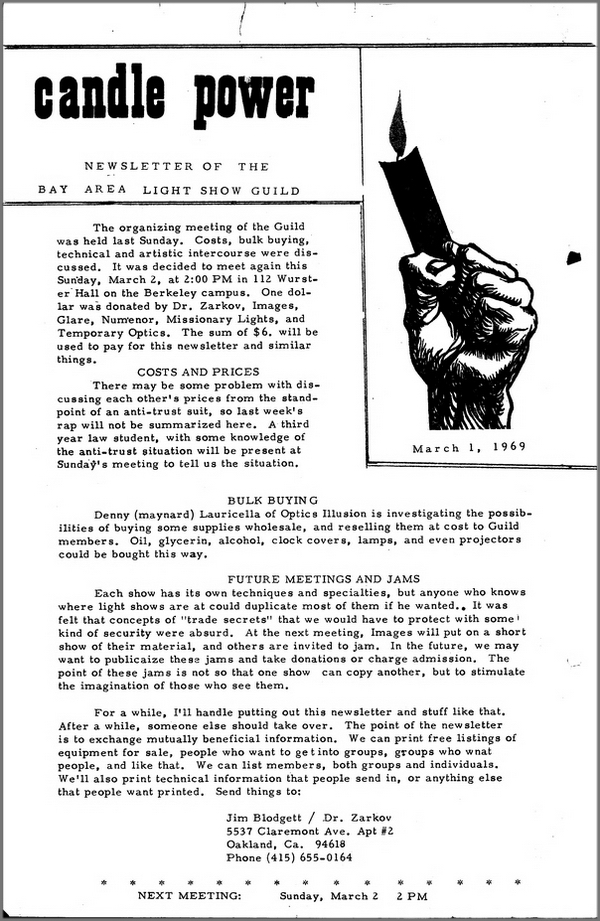 |
Courtesy of Rick Herbert, Optic Illusion |
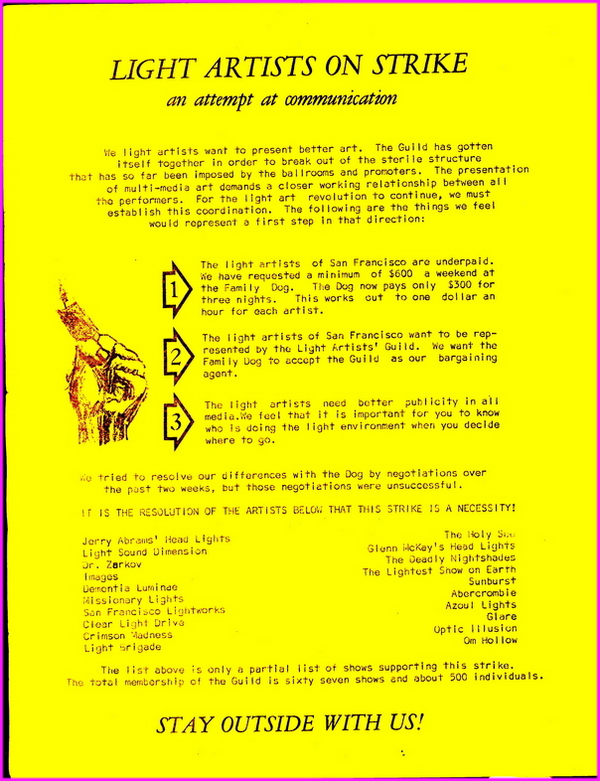 |
Courtesy of Rick Herbert, Optic Illusion |
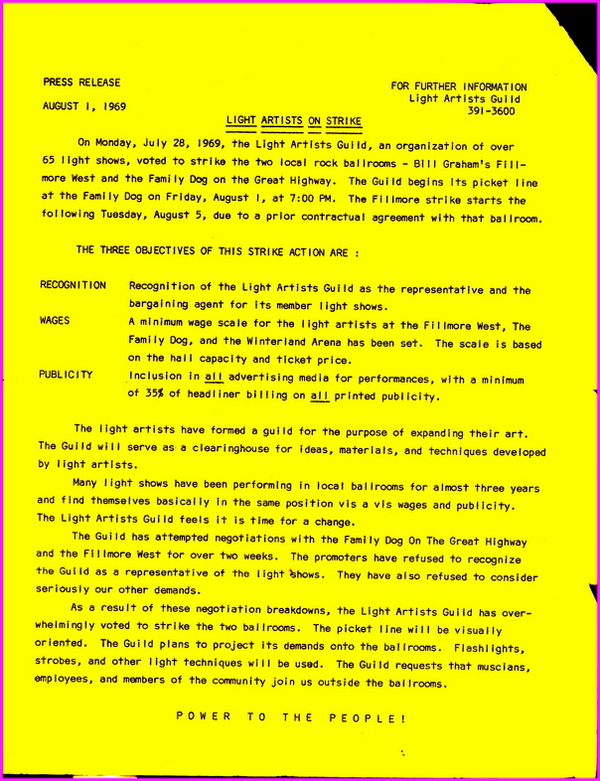 |
Courtesy of Rick Herbert, Optic Illusion |
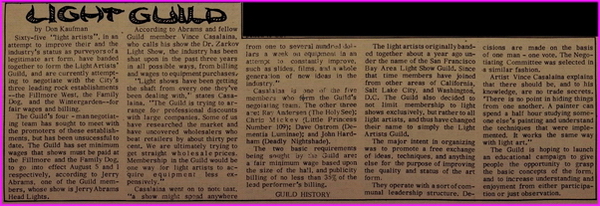 |
From Berkeley Tribe, Volume 9, issue 5, August 1-7, 1969 |
From Berkeley Tribe, Volume 1, issue 5, August 8-14, 1969:OUT ON THE EDGE By Art Johnson 'WE RE OUT ON THE EDGE - Hangin on, tryin to live, but tryin to live just a little bit better'” - Chet Helms Playland hot tamales, underground concrete johns that stink, the Wild Mouse, powder pancake ladies in furcoats playing pinball machines, the Fun House. “Original sensational enchiladas,” salt water taffy and long licorice sticks, lights, noise and carnival music pumping through the salty air-all reminiscent of a 1930’s movie. The power of the ocean roaring underneath it all sets a tone of melodrama. Bizarre. To stage left, the curtain of ocean mist rises on-The Family Dog on the Great Highway. It’s Friday night down in Playland, but there’s only 300 people inside the Family Dog, hoping to hear the Grateful Dead, who are late as usual. On the street outside the Light Artists Guild has set up a psychedelic picket line, with light show, conga drums, coffee and food. |
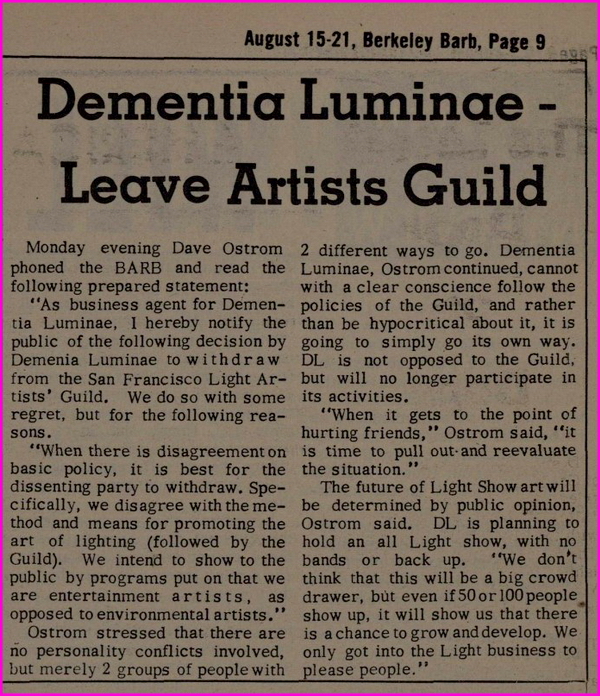 |
Berkeley Barb - August 15th 1969 |
Berkeley Barb, Volume 9, Issue 9, August 29 - September 4, 1969The Light Guild feels that light art is being crippled in its development. They complain that they are being paid the same wages that they were being paid three years ago, which is about a third of what an unknown group gets for playing the same gig. They say they deserve 1/3 of the promotional billing in the advertising. Are these claims valid? GRAHAM: The one there where there is some validity, on my posters you’ll see that the light artists do get credit, but sometimes in the newspaper ads, in the radio commercials, they weren’t included, that was my error, they’re right, they should be given recognition. But the other things, you have to start with who are we? To me we are ethical business people who deal with artists in our business. Billing and moneys do not relate just on the pure level, they relate to reality. Reality is, what brings in the dollar to keep us going? If a light show, in the opinion of the producer, does not bring in money, and only, not only, but makes a place more pleasant to be in, its much more conducive to having a good time, and opens the sensual pores, so that you relax, and the lights are going;but the people would come here anyway. See, the artists can say, the people do come to see us, its like a group comes in, they say, "We’re better than the Beatles”. In the end, its the decision of the producer to determine what attracts the public. Who is to tell me I should have plastic flowers in the cafeteria, or real flowers? If we had plastic flowers, we would draw just as many people. If we had black and white posters, instead of the montages which we've gotten into because I like them, we would get as many as we get, but I like them. The individual has the right to support art at whatever level he desires. The only negotiating point, therefore, that they have is that they are artists. A man has the right to go into a store and say: "1 want 49c chopped meat, or 69c chopped meat. That’s his prerogative. Therefore, the artist has no right to tell the producer at what level that producer must support art. If their negotiating point was like, say, Jefferson Airplane says “Mr. Producer, wewant$10,000.” I say, "No, $500.” "O.K., we’ll go across the street.” Therefore there’s a competative margin there. In order for me to have Jefferson Airplane, I must pay so much. Now, the artists could argue, if there were four or five ballrooms here, and we were competing with one another, you’d have to pay us more. Perhaps. When your light show gets to a point where it is a draw factor, I will admit to you, I will have to admit to you, I will have to pay you more, or risk losing you. Knowing that I don’t lose you, now, why is it that for the past 3 years, we haven’t had a light show for $50 a night. You made a statement before that there have been no raises in three years. I got into this business three and a half years ago. The first light show cost me $2500. In the first year they were making $50. The next year they were making $100. The next year they were making $150. The light shows now are making $175. The little thing that is not remembered is that my tickets in 3 1/2 years have gone up 20%. The cost of groups has gone up 500%. The star attraction used to cost $1500 a night, they now cost $5,000 a night. And everything else goes up, and they want more money. BARB: How many people does it take to run a light show? GRAHAM: That’s up to them. You do not pay a secretary $911 aweek because she has 17 children. This is what the job is worth to the man. As an artist, if you want more than what I think its worth, then artistically, I must desire that. I must be involved. We are interested on a level. We could do away with light shows ' completely. What 1 could do is buy $10,000 worth of equipment and get two Gremlins to move the machines, they won’t be as good as these guys, or I could eliminate them and just do stage lighting. It may not be as nice, we won’t lose that much business, in my opinion. But more important than anything else, I can not tell you what to wear. You can not tell me what to support. You may disagree with me, but, and this is something which you should never tell an underground newspaper, you have no negotiating power, other than being an artist. I respect you as an artist, but once you get beyond that point, what right do you have to treat this situation the way you did? The firstword I got that this organization existed; the first communication we had, was a letter. In it it said effective such and such a date, you will pay light artists such and such per show. What right does any person have to tell another person; "You MUST pay so much.” The same day Mr. Abrams called me and said, "Bill, I played in Los Angeles for another promoter, can you help me collect the money?” I said, "Jerry, you called me to help you collect the money, when an hour ago you threatened Country Joe and the Fish and Country Weather that if they crossed the picket line you would bad mouth them to the world, and now you ask me to help you? The two light shows that work here are perfectly satisfied. They had no gripes. But did you ever contact Bill Graham and say "We are the Light Show Guild, we want to talk to you.” No. But the other thing you did, you contacted the media, radio and television,... Do you know what you told the world? That we’re exactly like them. You used establishment tactics, and you told the establishment that we don’t know how to communicate. We don’t know how to sit down man to man and ARGUE if we have to, and yell and scream at each other for our rights, for your rights. Your tactics are as ugly as the fucking street I came from. And you want me to respect you? BARB: Where did you come from? GRAHAM: New York. Your letter failed, your pickets failed, and now you want to sit down and TALK? And... it got heavy. BARB: In '65 and ’66 there was a time when the Fillmore and The Family Dog were sort of the centers of a community that was developing. I’d like to know whatever happened to the community that was supposed to be being formed. GRAHAM: It may have started, but, uh, the seed may have been there somewhere, but in my opinion, again, we’re talking about opinions, not facts, the seed was in the ground, but there wasn’t enough water poured on, and I don’t think the flower ever surfaced. BARB: Why didn't that happen? GRAHAM: That’s a five hour question. It needs a five hour answer. It’s so easy to point as to who’s guilty and not guilty, the opportunist entrepreneur, which is an accusation that’s been, you know, we’ve been pointed at for a longtime. That maybe somebody’s opinion. Mine, there are basically two kinds of people, and I don’t mean just physically or mentally, just in the sense of a word, there are thse who DO, DOOO, and there are the other kind, who wait for something to be done to them, to be affected by life, and we have too many of the latter. There aren’t enough, there never were, in San Francisco, enough people, whether they do right or wrong, or good or bad, inactivity is wrong, mental inactivity, or sometimes physical inactivity. But this community has always been jammed with people who wait for life to affect them, rather than for them to affect life within themselves, or life around them. We had lovely people that used to come to the dances in ’65, ’66, ’67, with their plumage, their accessories, and feeling very good, and high, and dancing, and jovial, and painting on the floor, under the black light, but what else? O.K., you're 17, 18, 19, 20, 24 years old, you trip out, you get stoned, you go to dances, and you beg in the street, and you deal, WHAT ELSE? What else do you do about the world you dislike so much? Around you exists this ugly world, which you are always putting down. 1 may be as guity as you in not being able to affect a heavy change on the world. But whatever the level of attempt is, 1 am attemptirig to make some changes in an area. You can say: “You’re making money at it”. I’m not in the poverty program, I don’t know anything about peace corps, changing the fertility level of ground in Ugandi, or whatever. I’m involved with the music and theatrical taste level, on a mass of people, and the environmental effect on people when they come into a public place of assembly. In that way I am trying to make my mark. In doing that, we just happen to be dealing with the new, hip, revolutionary element. In doing so, we also make a very good living, and we employ x number of people, who also make a very good living. WHAT DO YOU DO? This is in answer to your question, the greatest tragedy in die last ten years, other than war and killings in Viet Nam, and the Civil Rights situation in America, for me, has been the tragedy of the Haight-Ashbury. The world said: "We’re looking at you, here we come, News and Look and Life and Time and Esquire, and we're getting on the street”. But what did the Haight Ashbury do, what did it say, where was the political platform? There never was a community. Look at Golden Gate Park. What do you have in Golden Gate Park? Everybody looks peaceful, nice, docile, stoned, freaky, throwin’ Frisbees, WHAT ELSE? Frisbies, and turning on, and hey, man, everything’s just groovy, outasight, TOO much! Too much what? BARB: I wonder if you would comment on an article in the Tribe which stated the opinion that you are part of a new scheme by the Establishment to exploit Rock & Roll Music, that yours is "Killer Rock & Roll”, that you "imprison our music between your psychedelic walls and suffer the people through long lines to grab their money and pack ’em in”? GRAHAM: In all the shows I’ve ever put on, we have never been more than 5% overcrowded, and as long as I’ve been here, I have never had a person come and ask for their money back because It was too crowded. If this is a plot, and I am a member of the Psychedelic Jewish Mafia, it’s been going on for 4 years, and I have never screwed an individual, never gone back on a contract. I am a theatrical Businessman, and this is how I run my business. Look, if you hate me, if you think I am a nasty Cocksucker who puts on good shows, O.K. But where is the validity for this accusation? I am fucking tired of it. They say "Your place is a rat hole”, then let them go across the street and do it better. There is no Monopoly here. I work 80-100 hours a week. Why? Money? Once you have enough food, clothes, and so on, what good is a lot of money? I consider myself lucky. My vocation and enjoyment are the same. I am not an artist. I know I don’t hold a candle to Picasso or any great artist, but 1 wouldn’t trade places with anybody in the world. I am happy doing what I am doing. As far as all these accusations in the underground press are concerned, I’m tired of being forced to defend myself. Everyone can decide for himself. |
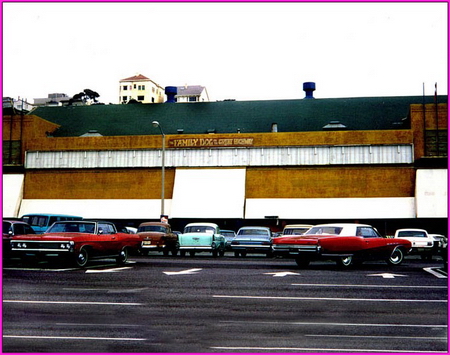 |
Family Dog on The Great Highway |
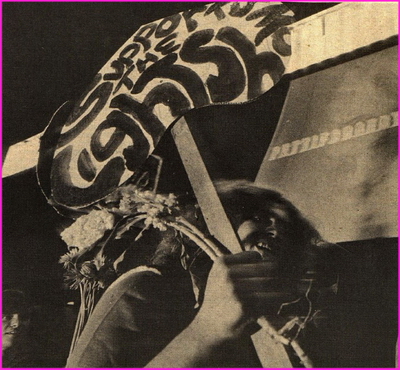 |
Light Artists Guild 'Protestor' (note the sign) |
“If the Dead crosses the line,” declares Jerry Abrams at the stage door, “as far as I’m concerned the rock trip in this city is down the drain. We would never cross a musician’s line.” The San Francisco light shows, 67 of them, all the major shows except the Brotherhood of Lights (which has a corner on the Fillmore -and intends to keep it) have come together to work for the development of their art form, and their economic survival. The Guild voted to strike the two San Francisco ballrooms in order to gain recognition for the Guild, equal billing with the bands, and a minimum pay scale. If Jerry Abrams is anything, he ain’t a businessman. He ain’t the world’s greatest organizer either. By throwing a picket line around the Family Dog, the Guild made a serious mistake. The Dog has been losing ! 4000 a week since it .opened on the Great Highway June 13. The Guild’s asking for a minimum of $300 a week. “I could use some money too,” Helms relates. “I haven’t been paid in 4 weeks. I still have a $50,000 personal liability from the Avalon. Very simply, we put the place together with 6 grand, and we’ve been given another 12 grand by our investors. I was counting on this weekend with the Grateful Dead to get a paycheck.” If the Dog ever turns a profit. Helms will get 30% to feed his Family. Inside the ballroom Friday night. Glare Light Show from Palo Alto is shedding light on the situation for 300 bills, but was turning the money back to Helms. Why didn’t Glare join the Guild, or at least honor the picket line? “It’s kind of insane,” Richard of Glare says. “Chet Helms doesn’t have any money. We want to help save the Family Dog. The Guild is a good idea, but if the Family Dog falls down, so does everybody else.” On the dance floor below, the feeling was summed up by one chick who comments; “We got to stand together, brother, it’s as simple as that. I came to hear the Grateful Dead-if they didn’t play then I wouldn’tcross the line.” When the Dead finally arrived, we all trucked out to their Metro van, 50 yards from the pounding surf, lit the peace pipe, and began to rap. It became clear that all of us are“out on the edge, hangin on, trying to live. Even the Dead are $50,000 in debt. “The way I experienced this strike,” Helms explained a few days later, “was like a run bn the bank. It feels like a precursor, you know, of what’s going to happen around the country. They’re looking at us to see not only what we can do about us, but what they can learn from us. We started out with the forms that were given, business forms, union forms, but for 3 years the whole fuckin world has been looking at us for new solutions. “If we work together collectively,” Jerry Garcia of the Dead offered, “we can all extend our forms. Right now the bands get more money than anybody else, and that's not righteous. “At one time,' said Helms, “people would come to the Fillmore just because it was happening. They didn’t know exactly what it was, but knew it was exciting. Then the record companies came in, put $50,000 on it, sealed it, packaged it, and said here is what it is. “I think essentially people don’t come to see this band or this light show-people come to have a good time. Billing is the linear structure we have to leave behind, I mean the draw game, man, where this group is best, this group next best, and so on, you dig? “I think, though, that light shows, you know,'in their relative importance to the whole thing have come down over the past few years, you dig? It isn’t necessary to say any more, 'Lights By ---' The Dead did not play Friday. But a temporary settlement was reached Saturday afternoon, so that the Family Dog could be open that night. Saturday night on the Great Highway was one of the best gigs since opening night, when the Airplane played. With the strike over, the Dead, Albert Collins and the far out Afro-Haitian Ballet played to a full house. The scene 'there gave off comfortable vibes. Bill Graham, at the meeting the following Tuesday, would rail on about his “rights” as a businessman, and his right to run the Fillmore exactly according to his whims, as the individual with the bread. “Why do we have light shows?” Graham would ask. “Why do we have apples in the cafeteria? Because I like them. The man with the dollars, and not the man with the art form, has the negotiating point, All well and legal. Yes, Bill Graham, the Fillmore is your personal trip, and that fact that it may be our trip too don’t bother you. Maybe that’s why I never go there, because I always feel the heavy presenceof somebody s personal money trip. But at the Family Dog Saturday night, I felt as free and comfortable as I would in a friend's home. "We’re all locked into gamesthe Family Dog. the Grateful Dead,” as Chet Helms said, “When are we something happening, but it doesn’t have, to be called the Family Dog-it can be The Common or whatever. Chet Helms is a businessman. But more than that, he is a member of our community, and he tries to act, not unilaterally, but as a mem ber of that community. In the eight weeks the Familly Dog has been on the Great Highway, eight different light shows have been allowed to play there. My interest in starting the Avalon three years ago," Chet told me Friday night in front of the picket line, "after Ihad come through a long bout with met edrine, was to change America in some way. And if this becomes just a straight gig, I can't do that either. "WE’VE GQT LIGHT AND SOUND: NOW LET’S GET IN TOUCH!” - Mike Bloomfield Bill Graham, it is said, has a moose on his oflice wall with a talk balloon that says “The name of the game is Draw'. "How do I get people to come see a good act like some gospel group from Chicago?” Graham asks. "The answer-, big name draw act, then your artistic act. Last week I had one of the greatest acts I've ever booked, the Everly Brothers, and I lost $6,000. "Now who in the fuck are you,” he asked the Guild, "to tell me, a businessman, to support your art? In my opinion, you are not a draw.” The several meetings with the Light Artists Guild were charged with theatre, from the street theatre of the "psychedelic strikers" to the drama of the grandest impressario of all. Bill Graham. Graham met with the group Tuesday afternoon at the Family Dog. A strike had been set for the Fillmore that night, and he w'as there to avert it. As the meeting opened, Chet threw the I Ching. "The waters on the surface of the earth flow together wherever they can,'' was the word: "Holding together brings good fortune' "If it isn't there," Helms said, "Idon't know where it is. Graham was the subject of the day. The Guild had struck the Family Dog first, apparently on the principle that you hit Chrysler before General Motors. Only, as a friend noted, Chet Helms isn't Chrysler. "Bill Graham has a monopoly in this town only because ,vou give it to him, " Chet told the brothers. "You can't depend on him to do it all, and then call him a dirty capitalist for doing it. Bill Graham, a capricorn, is a volatile man. He breathes fire, some would say indiscriminately. That afternoon he had the "leaders " of the Haight community in the palm ol his hands. "Chet runs this place on a dream. " the fiery eyed imiiressario led off. "and a very good dream. But he will be a failure till the day he dies, because he's too much of an idealist. 'The world has no appreciation for Christianity as Chet is preaching it' Graham focused on the point that the Guild had informed him of the strike even before trying to negotiate with him. The meeting became a contest between the aggressive capricorn figures of Graham and Jerry Abrams of the Light Artists Guild. As the meeting grew more heated (fired by Graham's baiting) it became clear that the person who could put on the best drama would win the day. And Abrams wasn't up to the fire of Bill Graham. "They disrespected a businessman!" Graham screamed, pacing the floor like a caged goat, "Who are they to tell me what to do with my money? You stupid motherfuckers! This isn't mudslinging! This is the facts!" Graham managed to raise emotion to a pitch, lighting into everyone who opened his mouth. “We've made mistakes, but we've been fair and honest. How many of you in this room ever got a check from me that bounced? How many benefits have I thrown for the community, benefits that have taken money out of my own pocket? How many groups made it w'ith our help? If I had come off the street, and gone into this, you could call me a cop out. But I'm not one of you. I'm a businessman. Effective January 1,he laid it out at last, tears coming to his angry eyes, "Im through in this town. The doors of the Fillmore will close for good. In New York, you got people giving speeches on corners, playing chess in the park, a guy over there talking about revolution in Idaho. "But do you know what you got here? You got a fucking vacuum. For four years, you haven't done shit. There's a man w'ho once told me about this community, 'It has got neither the balls nor the ability to change the world it hates. ' I hope to God he's wrong. "I hope to God your basic concept about who you are changes, because if you don't do it the IBM machine will "You know what this tiwn needs ’It needs maniacal good producers, maniacal good organizers. Around him sat the so-called leaders of the Haight community. They listened intently to Graham, the only among them who had been able to do It, and keep doing it. Graham looked around the room, and he laid it out cold to the peace-love, do-your-own-thing gentle brothers: "None of you will ever get in a position to step on me," he said, (paranoid to the end) "because none of you has the fucking balls. And not one person in the room questioned that statement. “I hope because I'm splitting, you will find out who you really are, and not sit around on your asses crying, 'lam an artist. I'm an artist,’ but pay your dues, and get a job on the side if you have to. "The greatest tragedy for me in the last 20 years, wars aside, is this community, because it could have done so much. And that rang deep and true. Graham rose in all his fury, his face blood red: “To accuse a man of showing emotion! ” he howled. “You slimy human being, you low motherfucking slimy --’ And the peace-love people wandered among each other in confusion, and somewhere in there the Guild called off the strike at the Fillmore-obviously defeated by Graham's masterful performance, and with Graham railing, and Chet Helms changing, arms upraised, “We were just getting to the nitty gritty of the problem, we were just getting to the nitty gritty of the problem. Graham ('Don’t touch me!') charged out the door. Shortly thereafter a hippie stumbled through the door, bleeding from the head after being hit by some drunks. A brick came hurling through the window while people mumbled about the right to “ do your own thing”. Peace and Love, Brothers, Peace and Love |
|
Jerry Abrams (Headlights) |
Download a PDF of the original articles:
|

